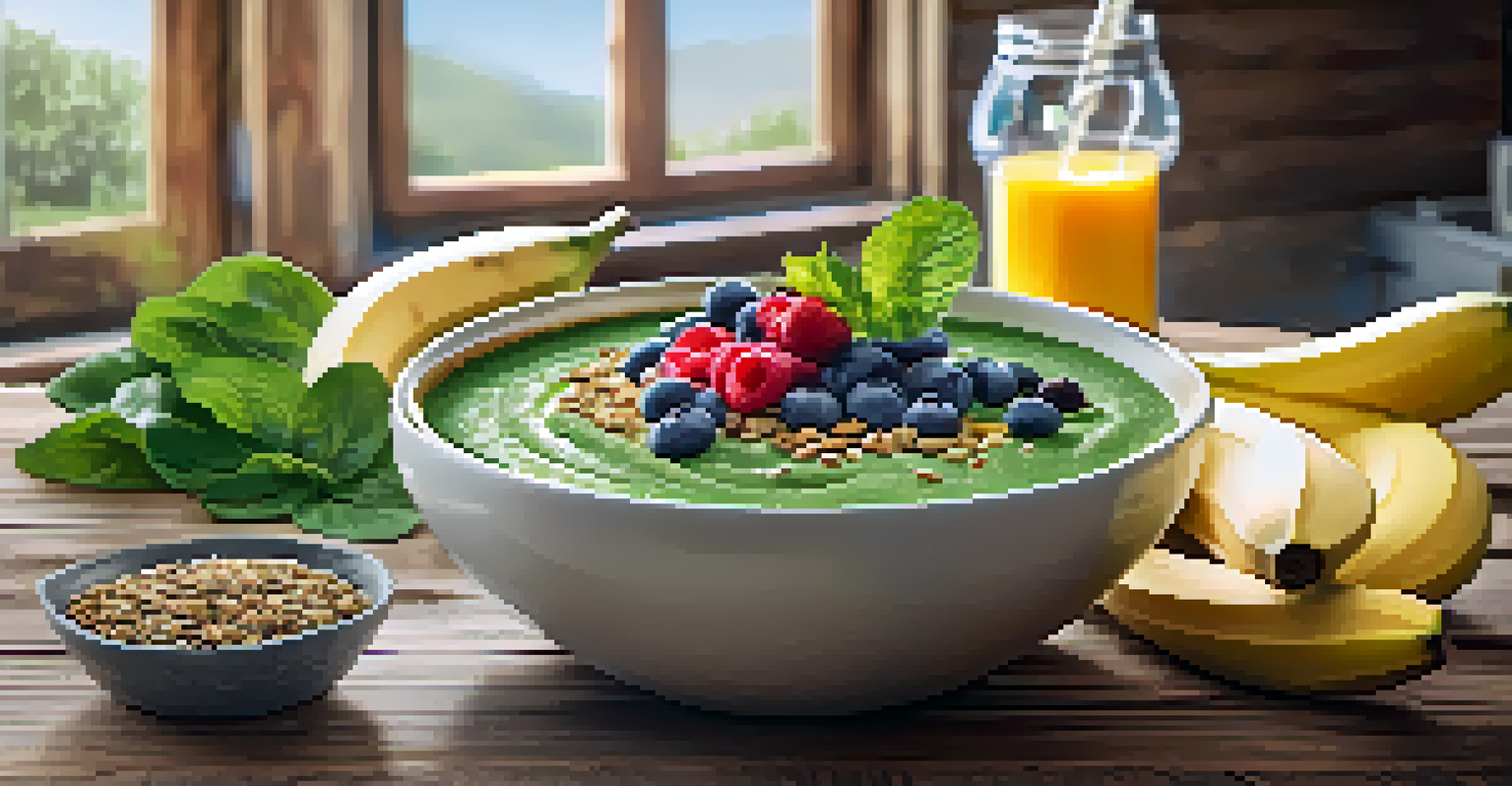Best Practices for Pre- and Post-Workout Nutrition Balance

Understanding the Importance of Workout Nutrition
Nutrition plays a vital role in enhancing your workout performance and recovery. It provides the necessary fuel your body needs to perform at its best, whether you're lifting weights, running, or practicing yoga. Just like a car needs gasoline, your body requires the right nutrients to keep running smoothly during and after exercise.
Let food be thy medicine and medicine be thy food.
When you consume the right foods before and after a workout, you can improve energy levels, boost endurance, and reduce muscle soreness. Think of it as preparing a garden; if you want it to bloom, you must water it and provide the right nutrients. In the same way, your body flourishes with proper pre- and post-workout nutrition.
Failing to consider your nutrition can lead to feelings of fatigue, decreased performance, and longer recovery times. If you want to get the most out of your workouts, make sure you're paying attention to what you eat before and after exercising.
Key Nutrients to Include Before a Workout
Before hitting the gym, it's crucial to fuel your body with the right mix of carbohydrates, proteins, and fats. Carbohydrates are your primary energy source, so think of options like bananas, oatmeal, or whole-grain toast. These foods break down into glucose, providing a steady stream of energy for your workout.

Additionally, incorporating a moderate amount of protein can help with muscle preservation and repair. Foods like Greek yogurt or a protein shake are great choices. Just remember, balance is key; too much protein can lead to an upset stomach while exercising.
Nutrition Fuels Workout Performance
Proper pre- and post-workout nutrition enhances energy levels, endurance, and muscle recovery.
Lastly, don’t forget about healthy fats! While they take longer to digest, including a small amount of fats, like avocados or nuts, can provide sustained energy. Timing your meals is also important; ideally, eat a substantial meal about 2-3 hours before your workout for optimal digestion.
Timing Your Pre-Workout Meal Effectively
Timing can make all the difference when it comes to your pre-workout meal. Eating too close to your workout may leave you feeling sluggish, while waiting too long can leave you under-fueled. A good rule of thumb is to aim for a meal 2-3 hours before exercising.
You are what you eat, so don’t be fast, cheap, easy, or fake.
If you’re closer to workout time—say, within 30-60 minutes—a small snack can help. Think of a piece of fruit, a handful of nuts, or a light smoothie. These options are easy to digest and will give you a quick energy boost without weighing you down.
Ultimately, the goal is to find what works best for your body. Everyone is different, so pay attention to how you feel during your workouts and adjust your meal timing accordingly. Your perfect pre-workout routine might just be a bit of trial and error.
Essential Nutrients for Post-Workout Recovery
After a workout, your body craves certain nutrients to help with recovery. The most important of these are protein and carbohydrates. Consuming protein helps repair muscle fibers that were broken down during exercise, while carbohydrates replenish glycogen stores.
For example, a smoothie made with protein powder, banana, and spinach can offer a perfect blend of these nutrients. Alternatively, grilled chicken with quinoa and vegetables provides a wholesome meal that helps your body bounce back. Think of it as a repair kit for your muscles!
Timing Matters for Meal Prep
Eating the right meals at the right times can significantly impact your workout effectiveness and recovery.
Hydration is another crucial aspect of recovery. Don’t forget to drink plenty of water after your workout, as it helps transport nutrients throughout your body and aids in muscle recovery. Consider adding electrolyte-rich drinks if you've had an intense session.
The Role of Hydration in Workout Nutrition
Hydration is often overlooked but is just as important as nutrition when it comes to workout performance. Water regulates your body temperature, lubricates your joints, and transports nutrients to give you energy. Dehydration can lead to fatigue, decreased performance, and even cramps.
To stay hydrated, aim to drink water before, during, and after your workouts. If you're exercising for longer periods or in hot environments, consider incorporating electrolyte drinks to replenish lost minerals. It’s like adding a pinch of salt to your meal; it enhances the flavors and provides essential nutrients.
Remember, everyone's hydration needs are different, so listen to your body. A good way to gauge your hydration status is by checking the color of your urine; light yellow usually indicates proper hydration, while darker colors may signal a need for more fluids.
Snacking Strategies for Energy Boosts
Sometimes, we need a little pick-me-up between meals, especially if you're gearing up for a workout. Healthy snacks can provide quick energy and essential nutrients to keep you going. Think of snacks as mini-meals that fuel your body and prevent energy crashes.
Great snack options include Greek yogurt with berries, a handful of almonds, or even rice cakes with nut butter. These choices are not only delicious but also provide the right balance of carbohydrates, proteins, and fats to keep you energized.
Hydration is Key for Recovery
Staying hydrated is crucial for regulating body functions and enhancing workout performance.
Incorporating snacks into your routine can make a significant difference in your performance and recovery. Plan ahead and have healthy snacks readily available, so you’re not left reaching for less nutritious options when hunger strikes.
Listening to Your Body: Personalizing Nutrition
Finally, it’s essential to listen to your body and adjust your nutrition accordingly. Everyone has different energy needs and responses to food, so what works for one person may not work for another. Keep a journal of what you eat and how you feel during workouts to identify patterns.
Experimenting with different foods and timings can help you discover your unique nutritional balance. For example, some might thrive on high-carb meals, while others might prefer a protein-rich diet. It’s all about finding what fuels you best.

Don’t be afraid to adjust as your fitness level and goals change. As you progress in your fitness journey, your nutritional needs may evolve, and being adaptable will help you stay at the top of your game.